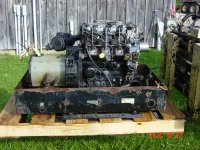Let’s try this another way......
A 120v gen won’t simply plug into your house (through transfer switch or otherwise) and run all your 120v appliances. The panel has 1/2 the circuits on one phase and the other 1/2 on the other phase.
OP doesn’t have the knowledge (based on the question (which is fine)) of electrical to know about phases, htz etc. So suggesting a 120v gen will work on a tight budget doesn’t paint a very accurate picture. A lot of the money would be eaten up adding or modifying the existing electrical panels at both houses.
If the OP sticks with 240v split phase gens (standard in the USA), he will get what he wants to back feed the house and run his welder. The brand, size etc will depend on the budget and brand recognition.
*as a note- with some modifications and illegal wiring their is a way to energize all 120v circuits in a panel with a single 120v gen. The juice isn’t worth the squeeze in most cases and risk of property loss or injury is real.
100% agree!
These threads always make me uneasy.
There is a big difference between a person that has extensive knowledge about electricity, structure wiring , and generators and a handy person that wants to simply start a generator and connect a plug to power their home.
No offense to anyone. We all have different knowledge and skills.
Can two non inverter generators be pallelled, yes, however it is a process that if done incorrectly results in catastrophic failure.
Can 2 homes be powered by 2 generators and tied together to spread the load, yes, however the gens must be synced, see above.
Errors with this subject result in equipment damage, appliance damage, house fire, and worse, injury or death.
The best solution in this case is a separate generator for each house. The proper way to connect a generator is through a transfer switch ( manual or automatic) or a generator circuit wired into the electrical panel with a lockout.
The lockout option is usually less expensive if a lockout kit is available for your panel.
Stay safe.
